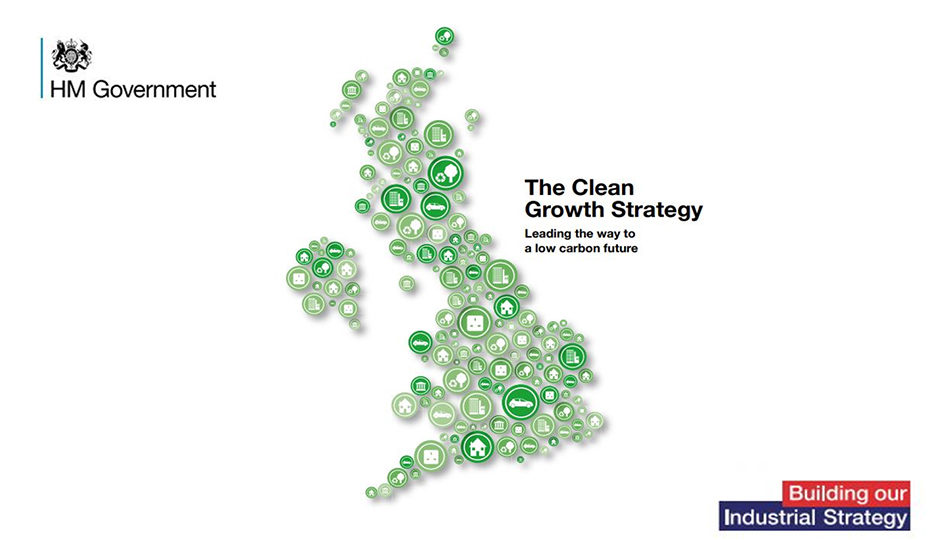The Clean Growth Strategy is a document that is hopefully going to push the UK towards a lower-carbon future. Compiled by the Department for Business, Energy & Industrial Strategy (BEIS), the Clean Growth Strategy is quite a read — if you just want to know the essential points read on for a summary of the strategy’s key features and what they mean for UK homes and businesses.
What are the essentials of the Clean Growth Strategy?
Firstly, we must know why this initiative even came about. In 2008, the UK launched the Climate Change Act, and became the first nation in the world to impose a legally binding carbon reduction aim on itself. Essentially, the objective is to bring down greenhouse gas emissions by at least 80% by 2050 (compared to 1990 levels).
Are we likely to achieve this goal?
BEIS research implies that this objective is surely and steadily being achieved. In fact, overall carbon emissions having dropped by 42% since 1990. While this progress is encouraging, the government acknowledges that there is still plenty more work to be done – and that’s where proposals like the Clean Growth Strategy come in.
Is the Clean Growth Strategy going to make a difference?
After reading the document, it appears that the Clean Growth Strategy will indeed assist in helping the UK achieve its green aims, as it seems as if it will speed up ‘clean growth’ by both decreasing emissions and increasing economic growth. With that in mind, the two guiding objectives underpinning the strategy are:
- To meet domestic commitments at the lowest possible net cost to UK taxpayers, consumers and businesses.
- To maximise the social and economic benefits for the UK from this transition.
It’s one thing creating a document and another implementing it. However, the government has stated that it will roll out lower-carbon processes and technologies around the country — doing so in the most cost-effective way for commercial firms and homes.
Main Clean Growth Strategy’s proposals
The following areas are under scrutiny by the Clean Growth Strategy, showing that a range of carbon-creating aspects have been considered. The document pledges to:
- Boost the UK’s business and industry efficiency (25% of UK emissions)
- Improve homes (13% of UK emissions)
- Speed up the shift to low-carbon transport (24% of UK emissions)
- Offer clean, smart, flexible power (21% of UK emissions)
- Better the benefits and value of our natural resources (15% of UK emissions)
- Lead the public sector (2% of UK emissions)
How will UK residents be affected?
Lowering carbon emissions is a collective aim and everyone from large businesses to new homeowners will play a part.
A major focus will be reassessing the fuels we use for jobs like heating, cooking, and powering industrial and manufacturing processes in a bid to embrace cleaner, greener alternatives. This will involve a drive towards renewable technologies — think biomass boilers and solar panels — as well as a move to cleaner conventional fuels instead of oil and coal. For example, for off-grid homes and businesses, the strategy sets out specific plans to phase out high-carbon forms of fossil fuels.
Natural gas is cost-effective, the lowest-carbon fossil fuel available, and accessible for premises connected to the mains network, so expect it to stay popular. Flogas, a business gas specialist in the energy sector for more than three decades, expects to see this part of its business continue to go from strength to strength.
The company also anticipates that the ‘green gas’ phenomenon (natural gas injected with a proportion of environmentally friendly biogas) will grow in popularity due to the Clean Growth Strategy.
How are people reacting to the Clean Growth Strategy?
Support has been overwhelming since the launch of the Clean Growth Strategy. Lee Gannon, managing director of Flogas, said: “Through the publication of its Clean Growth Strategy, the government has made clear its intention to reduce carbon emissions from off-grid UK homes and businesses. Natural gas is affordable, versatile, widely available and – most importantly – emits significantly less carbon than the likes of coal and oil. As such, it will continue to play a central role as the UK works towards cleaning up its energy landscape. We look forward to working alongside policymakers and wider industry stakeholders to make the Clean Growth Strategy the success that it deserves to be.”
At Oil & Gas UK, Mike Tholen — Upstream Policy Director — concurs that the document will be positive in its effect. He commented: “Oil & Gas UK welcomes the government’s commitment to technology in the strategy, especially with regards to carbon abatement measures such as carbon capture, usage and storage. Oil & Gas UK looks forward to working with the government to see how these technologies can further reduce emissions across the economy.”
prepared by Jamie Roberts (Copywriter)








